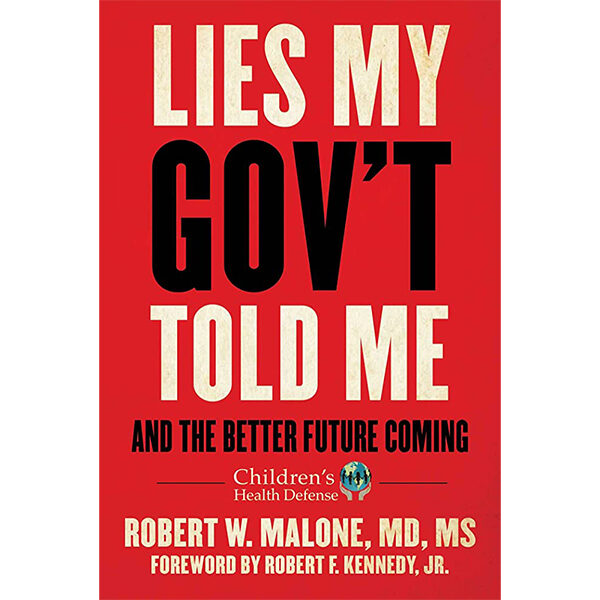Lies My Gov’t Told Me: And The Better Future Coming
$20.99
Question everything labeled “settled science.” In Lies My Gov’t Told Me, Robert W. Malone — a physician-scientist shaped by biodefense and vaccine development — documents how censorship, mandates, captured institutions, and punitive boards warped medicine and public trust. With a foreword by Robert F. Kennedy Jr., and chapters by Mattias Desmet, Pierre Kory, Meryl Nass, Paul Marik, and others, he examines the machinery and shows the human cost. Then he prescribes the recovery so patients, parents, clinicians, and citizens can defend informed consent and sovereignty.
In stock
Description
Start by testing claims, not people. Lies My Gov’t Told Me — with a foreword by Robert F. Kennedy Jr. — follows Robert W. Malone, MD, MS, an insider of biodefense and genetic-vaccine development, through the moment he realized that systems he once helped build were being used to police speech, restrict choices, sideline informed consent, and punish dissent. He traces how emergency policies, algorithmic moderation, bureaucratic punishment, and financial pressure converged to redefine “science” as decree. The opening sections read like a clinical intake — history and physical — naming symptoms in real time and introducing witnesses: Mattias Desmet on mass formation, Ed Dowd on spikes in all-cause mortality, Gavin de Becker on protecting children, Meryl Nass and Paul Marik on retaliation against dissenting physicians, Pierre Kory on bedside realities, and Leonard C. Goodman on the fact-checking industry’s power.
Diagnosis comes next. Malone contrasts science with scientism; recounts the sidelining of repurposed drugs; explains what it means to run the largest human experiment with mRNA platforms; and describes how public-health utilitarianism eroded autonomy, turning “informed consent” into paperwork. He points to structural failures — ARPA-H’s intelligence entanglements inside NIH, model-driven policy with no feedback loop, corporate media that sells certainty while burying uncertainty, and platform censors that throttle debate. Chapters on inverted totalitarianism, behavioral control, propaganda incentives, and the economics of lockdowns place policy inside incentives, not gimmicks.
Finally, treatment. The closing section moves from critique to concrete action: resist groupthink inside the administrative state; rebuild independent media and professional guilds; reassert medical ethics; secure personal sovereignty over health decisions; and revive bottom-up resilience — victory gardens and peer-to-peer care models such as Hippocrate Org, with mutual-aid networks to match local need. Throughout, Malone does what clinicians do at the bedside: revisit the chart, compare notes, change course, and document the plan when the data demand it.
Lies My Gov’t Told Me will serve physicians who value autonomy, parents navigating mandates, policy analysts tracking institutional capture, and citizens determined to guard civil liberties. The better future Malone sketches is not utopian; it rests on older duties — truth-telling and consent, anchored by prudence and courage — and it begins wherever readers choose to think for themselves and act with courage. (2022, 480pp, hb)
You may also like…
-

Benedict Biden: Water Carrier For The New World Order
$1.99 Select options This product has multiple variants. The options may be chosen on the product page -

End Game
Price range: $3.99 through $14.95 Select options This product has multiple variants. The options may be chosen on the product page -

COVID Vaccine: The Bad & The Ugly (There is No Good)
$1.00 Add to cart


